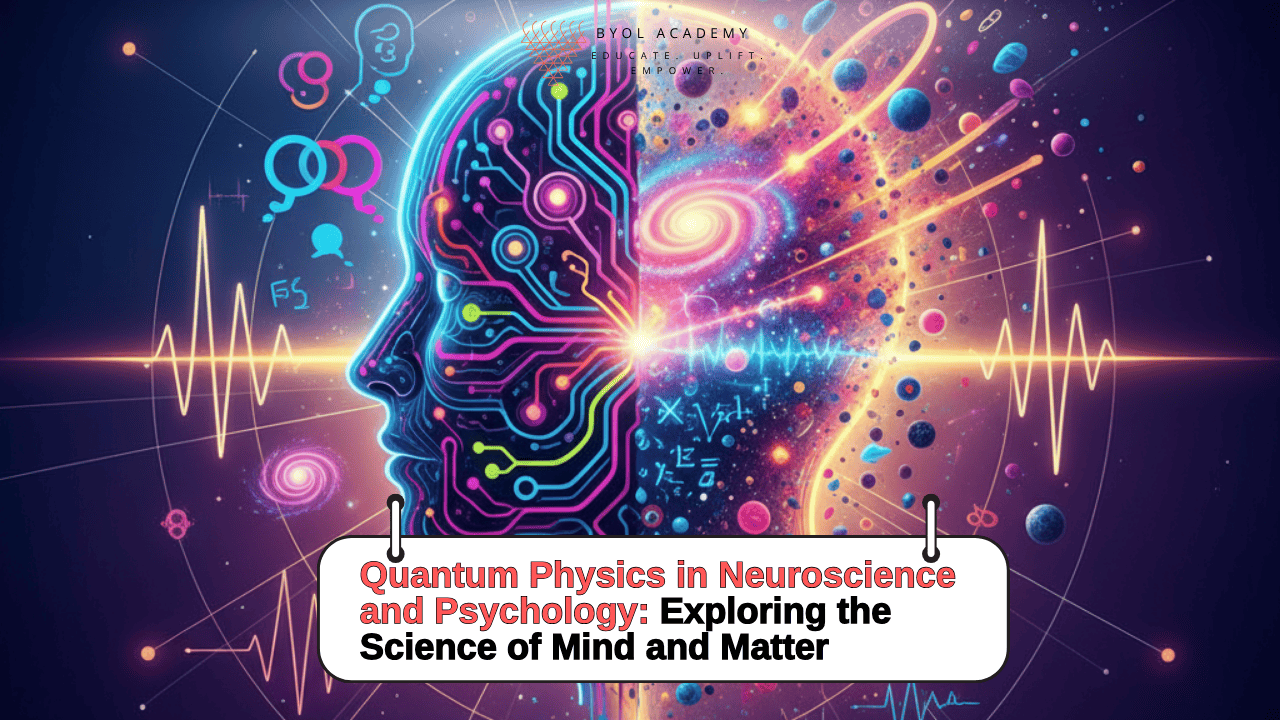In today’s fast-paced world, where academic competition and screen-based lifestyles dominate a student’s routine, the importance of physical fitness and […]
Quantum Physics in Neuroscience and Psychology: Exploring the Science of Mind and Matter

Even with remarkable progress in neuroscience, the study of the human brain has long been guided by biology and chemistry, revealing intricate networks of neurons and the complex chemistry that drives thought and emotion. As research deepens, a new dimension of understanding is beginning to emerge through the lens of quantum physics.
The laws that govern the smallest particles in the universe may also influence the hidden workings of the mind. Subtle quantum events could shape how information flows through the brain, guiding the emergence of awareness and perception. This evolving connection between quantum physics, neuroscience, and psychology is transforming how science understands cognition, uniting precision with complexity in the study of consciousness.
When Physics Meets the Mind
Quantum physics describes the invisible world of energy and probability, where particles can exist in two places at once, and outcomes remain uncertain until observed.
This defies the familiar logic of classical science, where everything seems predictable and measurable. Yet, the brain, dynamic, mysterious, and creative often behaves more like a quantum system than a mechanical one.
Thoughts appear and disappear, choices shift, and perceptions collapse into clarity only when attention focuses “a striking resemblance to the quantum collapse of wave functions”.
The Quantum Brain Hypothesis
The human brain is an incredibly complex system of around 86 billion neurons, each communicating through tiny electrical and chemical signals.
- Some scientists propose that quantum processes may occur inside these neurons, influencing how the brain processes information and creates consciousness.
- One leading theory, called the Orchestrated Objective Reduction (Orch-OR) model -developed by physicist Sir Roger Penrose and anesthesiologist Stuart Hameroff suggests that quantum vibrations within microscopic structures known as microtubules could be linked to conscious thought.
Although this idea remains controversial, it has sparked global interest in exploring how quantum mechanics and brain function might be connected.
Quantum Psychology: How the Mind Thinks in Probabilities
In psychology, researchers are also finding parallels with quantum principles.
Human decision-making often defies logic, people can hold conflicting beliefs, act unpredictably, and change opinions suddenly.
- This has led to the development of quantum cognition, a field that applies quantum mathematics to model how people think and make choices.
- Studies show that human reasoning sometimes aligns more closely with quantum probability than with classical logic, especially in situations involving uncertainty, emotion, or paradoxical thinking.
In other words, the human mind may process information in a quantum-like way, fluid, flexible, and context-dependent.
The Observer Effect and Conscious Awareness
One of the most fascinating parallels between quantum theory and neuroscience is the observer effect.
In quantum experiments, observation affects the behavior of particles. Neuroscience finds something similar: where we place our attention changes how our brain behaves.
Studies using functional MRI show that meditation, visualization, and focused awareness can literally reshape brain circuits- strengthening attention, emotion control, and empathy.
This phenomenon, known as neuroplasticity, is the biological mirror of quantum observation “conscious awareness altering physical structure”.
Medical and Therapeutic Implications
The integration of quantum concepts into neuroscience and psychology could open new doors for medicine and mental health care.
Potential implications include:
- Improved understanding of consciousness and its role in mental health.
- Development of quantum-based diagnostic models using advanced computing to simulate brain processes.
- Enhanced mind–body therapies, recognizing how thought, emotion, and energy can influence biology.
- Energy-based medicine, exploring how electromagnetic and quantum fields interact with cells and tissues.
These concepts remain in early stages, but they represent an exciting frontier where physics meets biology.
A Field Still in Discovery
Despite growing enthusiasm, it’s important to note that direct evidence of quantum activity in the brain remains limited.
The brain is warm, wet, and noisy conditions that usually disrupt quantum coherence.
However, recent discoveries in quantum biology such as quantum effects in photosynthesis and enzyme activity suggest that nature may indeed use quantum principles in living systems.
If the brain proves to be one of them, it would mark a profound shift in our understanding of human consciousness.
A New Vision for Mind and Medicine
The intersection of quantum physics, neuroscience, and psychology encourages a more holistic view of health.
It invites us to see the mind not as separate from matter, but as part of a single, interconnected system where thoughts, awareness, and biology continuously interact.
We are both the observer and the observed, as some scientists put it. “The universe and the mind reflect each other in ways we are only beginning to understand.”
References
- Quantum physics in neuroscience and psychology: a neurophysical model of mind–brain interaction; Schwartz JM, Stapp HP, Beauregard M. Philosophical Transactions of the Royal Society B: Biological Sciences. 2005 Jun 29;360(1458):1309–1327. doi:10.1098/rstb.2004.1598.
- Quantum effects in the brain: A review; Adams B, Petruccione F. arXiv preprint. 2019 Oct 17. (Explores proposed quantum processes in neural systems).
- Quantum concepts in Psychology: Exploring the interplay of physics and the human psyche; (2023) Elsevier. Examines quantum‐mechanical analogies in cognitive and emotional processing.
- Quantum Cognition – Quantum Analogy; Fortescue M. European Review. 2022;30(5):708‐724. doi:10.1017/S106279872100020X.
- Quantum Measurement, Consciousness, and the Soul: a New, Alternative Position; Werbos PJ. Activitas Nervosa Superior. 2019;61:41-47. doi:10.1007/s41470-019-00038-z.


